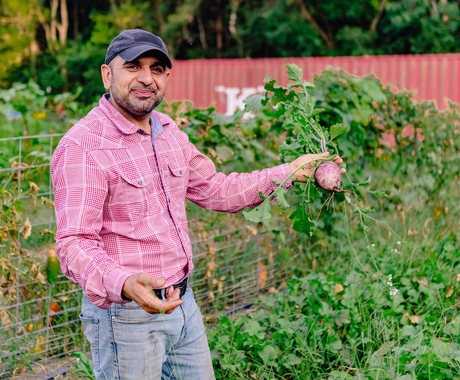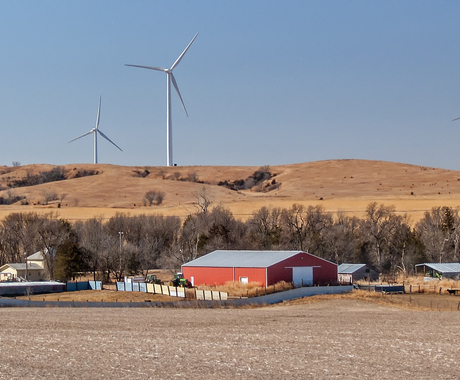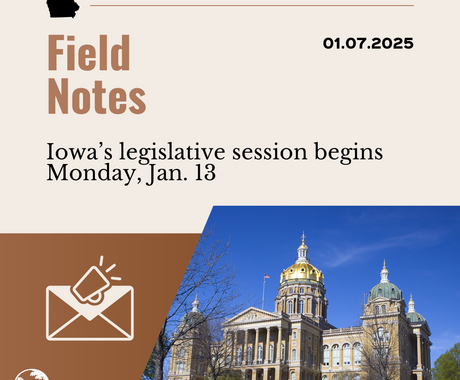By Teresa Hoffman, former staff member
While working as a software engineer, Gary Fehr took an interest in learning where his food comes from, why it matters, what methods are used, and how they affect the environment and local economies.
Thus began a career transition for the Raymond, Nebraska, resident.
“I started to get involved in local food organizations and meetinI hag farmers and helping out on farms, just trying it out to see if it was something I wanted to do,” Gary said.
After working on an organic vegetable farm near Raymond for one season, Gary is now in his seventh growing season operating Green School Farms, where he has not only taken an interest in providing local, sustainably-produced food to schools, but also to the community via his website, Community-Supported Agriculture program, farmers market, and wholesale accounts.
Recently, Gary joined Robert Bernt of Clear Creek Organic Farms in Spalding, and Paula Sandberg of Heritage Acres in Stratton for a discussion on local food systems. “New Opportunities, Future Challenges: A Discussion on Local Food Systems” was hosted by Center for Rural Affairs policy associates Kalee Olson and Trenton Buhr.
Getting fresh food in schools
As he built his operation, Gary said he was convinced of the need to get fresh local food in the schools not only as a way of helping the local economy and build his operation, but also for the health of kids and to help educate them about why it’s important to know where their food comes from.
Gary said he was alarmed to find out that a majority of the food used in Nebraska schools comes from outside of the state. But, as a result of legislation passed earlier this year in Nebraska, he and other advocates of a farm to school program may see more locally-grown food making its way to school cafeterias across the state.
Introduced by Sen. Tom Brandt, and passed unanimously, Legislative Bill (LB) 396 creates a statewide farm to school program, which will be administered by a full-time coordinator within the Nebraska Department of Education.
“I think we need to do better,” Gary said of using locally-grown food. “I think LB 396 is going to be a big help in this and I think we are seeing some grassroots movements and interest in schools working with farms and farms working with schools to make that happen.”
Gary said a farm to school program provides tremendous opportunities for vegetable producers like him and small-scale meat and ag producers to get products into schools. But, he said, it will take creating awareness about the products available, what is available, and in what quantities.
The formation of food hubs or networks may also be key to helping smaller-scale producers such as him meet the needs of schools, whom he said are used to getting larger quantities from national distributors.
“We need to be talking about this at all levels,” Gary said. “Small scale grass roots, but also large, more statewide. I’m excited about LB 396.”
Taking local food sales online
Paula Sandberg and her husband Chris raise artisan beef, open-air pork, and pastured eggs on their farm in Stratton, Nebraska, and recently began doing bulk sales online four times a year through their website heritageacres.net.
Knowing the work it takes to manage the website and market products on social media, Paula opened the opportunity to other producers, essentially creating an online farmers market. This market season, there are 350 products being sold by 20 vendors. All items are presold, which helps cut down on waste, and delivered for a weekly drive through pick up in McCook. Items cannot be shipped.
Paula is pleased with what has been assembled, saying a food hub or online farmers market can give small producers a way to find niche customers for their products.
“I’ve lived here my whole life and didn’t even know the amount of amazing food that is here,” she said of the produce, bread, beef, lamb, pork, chicken, eggs, and other items available. ‘It’s really, really exciting.”
Paula hopes that, through this online platform, customers learn the value of local foods and connecting with producers.
“This builds a connection that is very powerful and lasting,” she said.
As with Gary, Paula is pleased with the passage of LB 396, as well as LB 324. Also introduced by Sen. Brandt, LB 324, passed unanimously by the Legislature, makes it easier for consumers to buy meat directly from producers or processors and creates the Independent Processor Assistance Program.
“To get everybody to sit down and talk about food policy is exciting,” Paula said.
LB 324 is a blessing
Pointing to a family photo behind him, Robert Bernt of Clear Creek Organic Farms near Spalding, Nebraska, indicated much of what has been done on his operation was to create an incentive.
“We have added value to the product we have to bring the children home,” he said, pointing out that it has brought some of them back.
As a result, he and his family manage a diversified operation, selling pork, beef, dairy products, vegetables, and more. In addition to selling locally-produced food, the Bernts also manage an on-farm certified kitchen and separate cheese and meat processing facilities.
Robert was among supporters offering testimony as part of a committee hearing on LB 324 earlier this year. He said there is a huge opportunity as a result of the bill’s passage because people have experienced what a good steak and hamburger taste like.
“LB 324 was a blessing,” he said. “We need something like this to help give smaller processors an incentive to expand. The cost of equipment is phenomenal. There’s a lot of things that will help those processors potentially be able to market directly to individuals.”
In the last year, Robert said his facility did processing for about a dozen producers who had never sold direct to customers before. When COVID-19 forced larger facilities to pause or shut down, many producers turned to direct sales and for some of the customers, it was a new experience.
“As a result, we tried to make sure there was as good an experience as possible with that product because they were going to a customer who had never purchased that way before,” Robert said. “So we tried to help them establish a good relationship.”
Still a learning process
Whether it’s selling to schools, businesses, or individuals, Gary, Paula, and Bob said it’s a learning process and will continue to be. But, in the end, having a strong local food system is important and the goal should be to make it convenient for farmers and consumers.
The trio encourages producers just getting started, to reach out to people like them, who have gone through the process, made mistakes along the way, and have made it to where they are doing well.
“We like to see other people succeed and we know there is more demand than supply, so we are all for other people going out there and succeeding,” Paula said.





